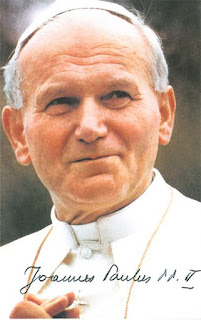 |
Pope Saint John Paul II. the Great
(Saint Karol Józef Wojtyła)
/1920-2005/
Photo credit:
|
(PL) „zasada pierwszeństwa »pracy« przed »kapitałem«. Zasada ta dotyczy bezpośrednio samego procesu produkcji, w stosunku do której praca jest zawsze przyczyną sprawczą, naczelną, podczas gdy »kapitał« jako zespół środków produkcji pozostaje tylko instrumentem: przyczyną nadrzędną. Zasada ta jest oczywistą prawdą całego historycznego doświadczenia człowieka.”
(HU) „a »munka« elsőbbségének princípiuma a »tőkével« szemben. E princípium nagyon szorosan kötődik a termelési folyamathoz, melyben mindig a munka az elsődleges létrehozó ok (causa efficiens), míg a »tőke« a termelési javak összességében mindig csak eszköz vagy eszközök (causa instrumentalis). Ez az elv az ember teljes történelmi tapasztalatából merített evidens igazság.”
(LAT) „»labori« priores partes deferantur quam opibus »capitalibus«; quod quidem principium ad cursum bona pariendi proxime pertinet, cuius si ratio habetur, labor semper est primaria causa efficiens, cum opes »capitales«, quae sunt summa subsidiorum ad bona parienda, solummodo instrumentum sint seu causa instrumentalis. Hoc principium profecto est veritas perspicua, ex tota hominis experientia historica fluens.”
(EN) “the principle ot the priority of »labour« over »capital«. This principle directly concerns the process of production: in this process »labour« is always a primary efficient cause, while capital, the whole collection of means of production, remains a mere instrument or instrumental cause. This principle is an evident truth that emerges from the whole of man's historical experience.”
(IT) „il principio della priorità del »lavoro« nei confronti del »capitale«. Questo principio riguarda direttamente il processo stesso di produzione, in rapporto al quale il lavoro è sempre una causa efficiente primaria, mentre il »capitale«, essendo l'insieme dei mezzi di produzione, rimane solo uno strumento o la causa strumentale. Questo principio è verità evidente che risulta da tutta l'esperienza storica dell'uomo.”
(DE) „das Prinzip des Vorranges der »Arbeit« gegenüber dem »Kapital«. Dieses Prinzip betrifft direkt den Produktionsprozeß, für den die Arbeit immer eine der hauptsächlichen Wirkursachen ist, während das »Kapital«, das ja in der Gesamtheit der Produktionsmittel besteht, bloß Instrument oder instrumentale Ursache ist. Dieses Prinzip ist eine offensichtliche Wahrheit, die sich aus der ganzen geschichtlichen Erfahrung des Menschen ergibt.”
(FR) „e principe de la priorité du »travail« par rapport au »capital«. Ce principe concerne directement le processus même de la production dont le travail est toujours une cause efficiente première, tandis que le »capital«, comme ensemble des moyens de production, demeure seulement un instrument ou la cause instrumentale. Ce principe est une vérité évidente qui ressort de toute l'expérience historique de l'homme.”
(ES) „el principio de la prioridad del »trabajo« frente al »capital«. Este principio se refiere directamente al proceso mismo de producción, respecto al cual el trabajo es siempre una causa eficiente primaria, mientras el »capital«, siendo el conjunto de los medios de producción, es sólo un instrumento o la causa instrumental. Este principio es una verdad evidente, que se deduce de toda la experiencia histórica del hombre.”
(PT) „o princípio da prioridade do »trabalho« em confronto com o »capital«. Este princípio diz respeito directamente ao próprio processo de produção, relativamente ao qual o trabalho é sempre uma causa eficiente primária, enquanto que o »capital«, sendo o conjunto dos meios de produção, permanece apenas um instrumento, ou causa instrumental. Este princípio é uma verdade evidente, que resulta de toda a experiência histórica do homem.”
(SK) „Je to zásada prvenstva »práce« pred »kapitálom«. Táto zásada sa priamo vzťahuje na výrobný proces, pri ktorom je práca vždy prvoradou účinnou príčinou, zatiaľ čo »kapitál«, ako súhrn výrobných prostriedkov, zostáva iba nástrojom alebo nástrojovou príčinou. Táto zásada je evidentnou pravdou, ktorá vyplýva z celej historickej skúsenosti ľudstva.”
(Laborem exercens, Castel Gandolfo, 14. 09. 1981. 09. 14.)


